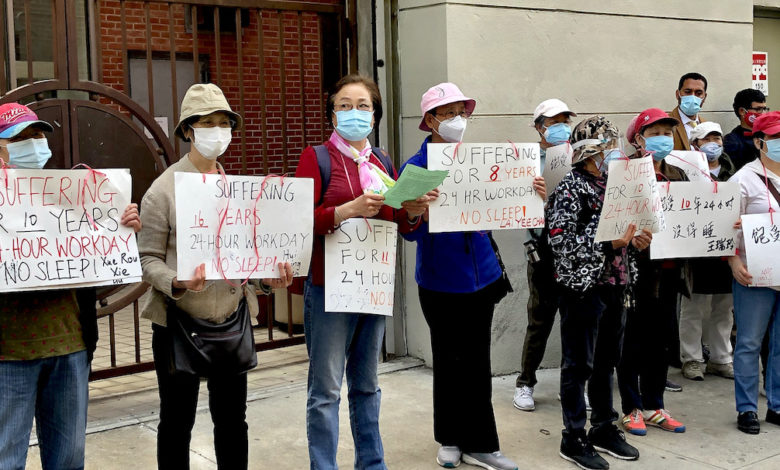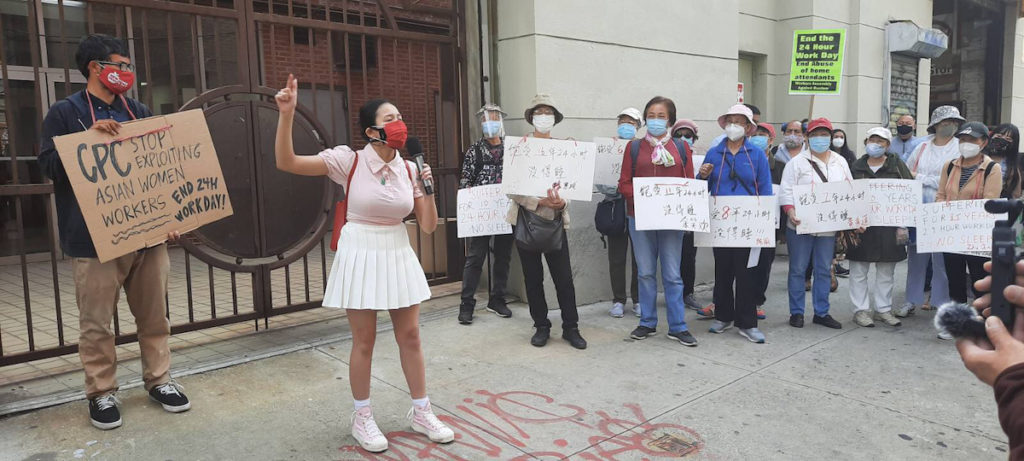
On April 28, over 50 home healthcare workers and their supporters gathered outside of the Lower Manhattan offices of the Chinese-American Planning Council in New York City to protest a long history of wage theft and poor working conditions, including a 24-hour workday with little rest.
The protest was primarily organized by CPC workers and the Chinese Staff and Workers Association and attended by the National Mobilization Against Sweatshops, the Democratic Socialists of America, the Workers Assembly Against Racism, the Asian American Feminist Collective, and the Party for Socialism and Liberation.
The action communicated the threefold demands of the workers: to immediately pay back stolen wages, institute 12-hour split shifts for home health workers, and to apologize to the women who have been exploited by these unfair labor practices.
Workers are also seeking compensation and recognition for disabilities caused by poor working conditions. One CPC worker, Xiao Yuan Yu, raised her partially paralyzed hands mid-speech, so that even those in the crowd who didn’t speak Mandarin could understand the dire situation of many home attendants.
Another speaker, María Rodriguez, worked for CPC as a home attendant for five years before quitting due to unfair work conditions. “Many times, I would spend the entire weekend working 24 hours, for 72 hours straight,” she explained through a translator. “To me, it’s brutal and dehumanizing, and it’s time we fought to end the 24-hour workday!”
CPC history of wage theft and forcing attendees to work long hours
CPC is one of New York City’s largest nonprofits and receives over $220 million dollars a year in public funds and spends over $184 million on its Home Attendant Program, which provides home care professionals to senior citizens throughout the city. However, due to a New York law which allows home care providers to only pay their employees for 13 hours of work in a 24-hour workday, CPC, as well as many other home care providers, have been able to steal thousands of hours worth of wages from their workers.
The provision allots a maximum 13 hours of paid work for home attendants, with an additional unpaid eight-hour sleep break and three hours for meals. Yet, with no one to cover for their patient’s needs during these breaks, attendants usually end up working around the clock, which translates to vast amounts of unpaid labor.
As a government-associated nonprofit, CPC claims that its hands are tied by the state’s pay requirements, and that it has consistently pushed for split shifts. However, workers say that the organization does little to actually pressure the state to change its laws. Workers have also been involved in class action lawsuits against CPC over unpaid back pay since 2014, and claim that the organization is willfully “dragging it out.”
“If you really say that your hands are tied and you can’t do anything within the system, maybe you should consider going outside the system,” said Tiffany Diane Tso of the Asian American Feminist Collective. “If the system in place is exploiting the people you claim to protect, then maybe that system needs to be dismantled.”
Currently, organizers and workers are urging a boycott of the CPC. To learn more about how to stop the 24-hour workday, visit aintiawoman.org.







